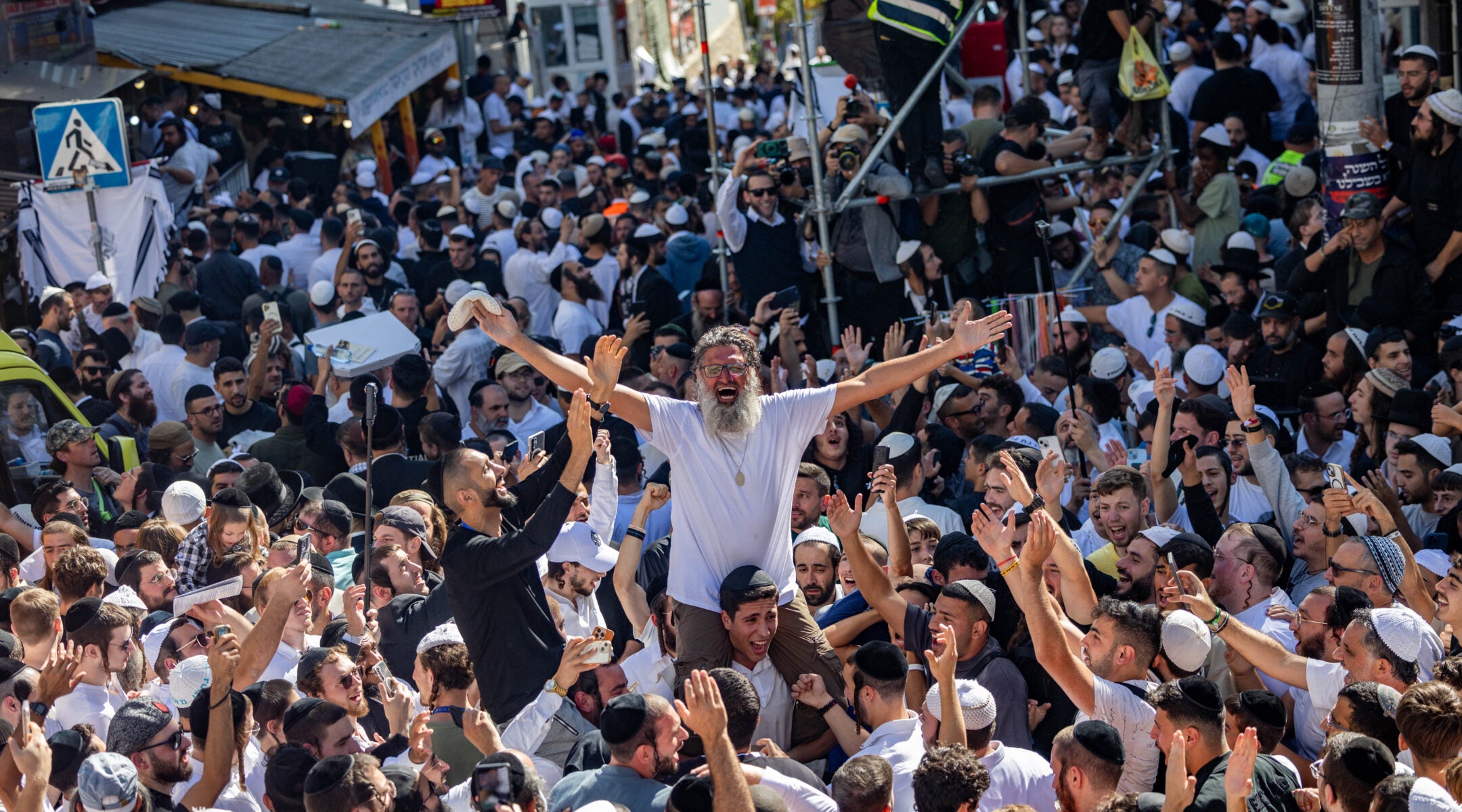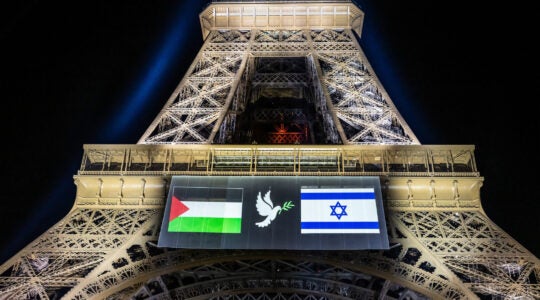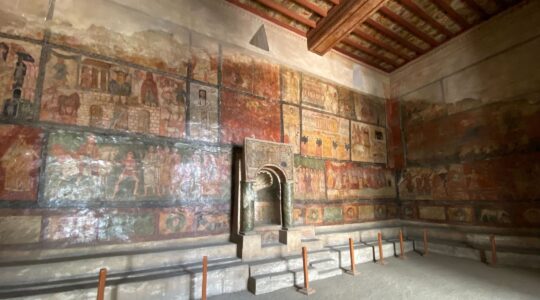UMAN, Ukraine — Yaakov Bermann made his way from Jerusalem to this Ukrainian city in time for Rosh Hashanah this year, when the population swells with pilgrims seeking to pray at the grave of the Hasidic rabbi Nachman of Bratslav.
But one of his close friends, he said, wasn’t so fortunate. The friend was arrested at Tel Aviv’s Ben Gurion Airport, one of more than 100 haredi Orthodox men who have been ensnared in a dragnet against draft dodgers while trying to leave Israel.
“ That’s a big mistake they’re making,” Bermann said, referring to the Israeli government’s crackdown. “I feel like if they approached it in a more civil manner instead of force, it would definitely make more change.”
The airport arrests point to how this year’s Uman pilgrimage has emerged as a flashpoint in one of Israel’s most volatile political issues: whether haredi yeshiva students must serve in the Israeli army two years into the country’s longest war. The political jousting over the pilgrimage has added to ongoing challenges related to mass travel into Ukraine while the country is at war with Russia that have colored the pilgrimage in recent years.
Each year, tens of thousands of Jewish pilgrims descend on Uman to visit the tomb of Rabbi Nachman, the founder of the Hasidic Breslov sect. What began as a pilgrimage just for Breslov Hasidim has morphed into a journey for Jews from many different walks of life. This year, more than 40,000 Jews were expected to flood into Uman, temporarily increasing its population by nearly half.
An entire ecosystem springs up to serve the pilgrims — temporary housing, pop-up restaurants and, increasingly, security services that are not required at the site the rest of the year. Ukrainian soldiers accustomed to battling at the front against Russia have been deployed to the sleepy city in relatively calm central Ukraine.
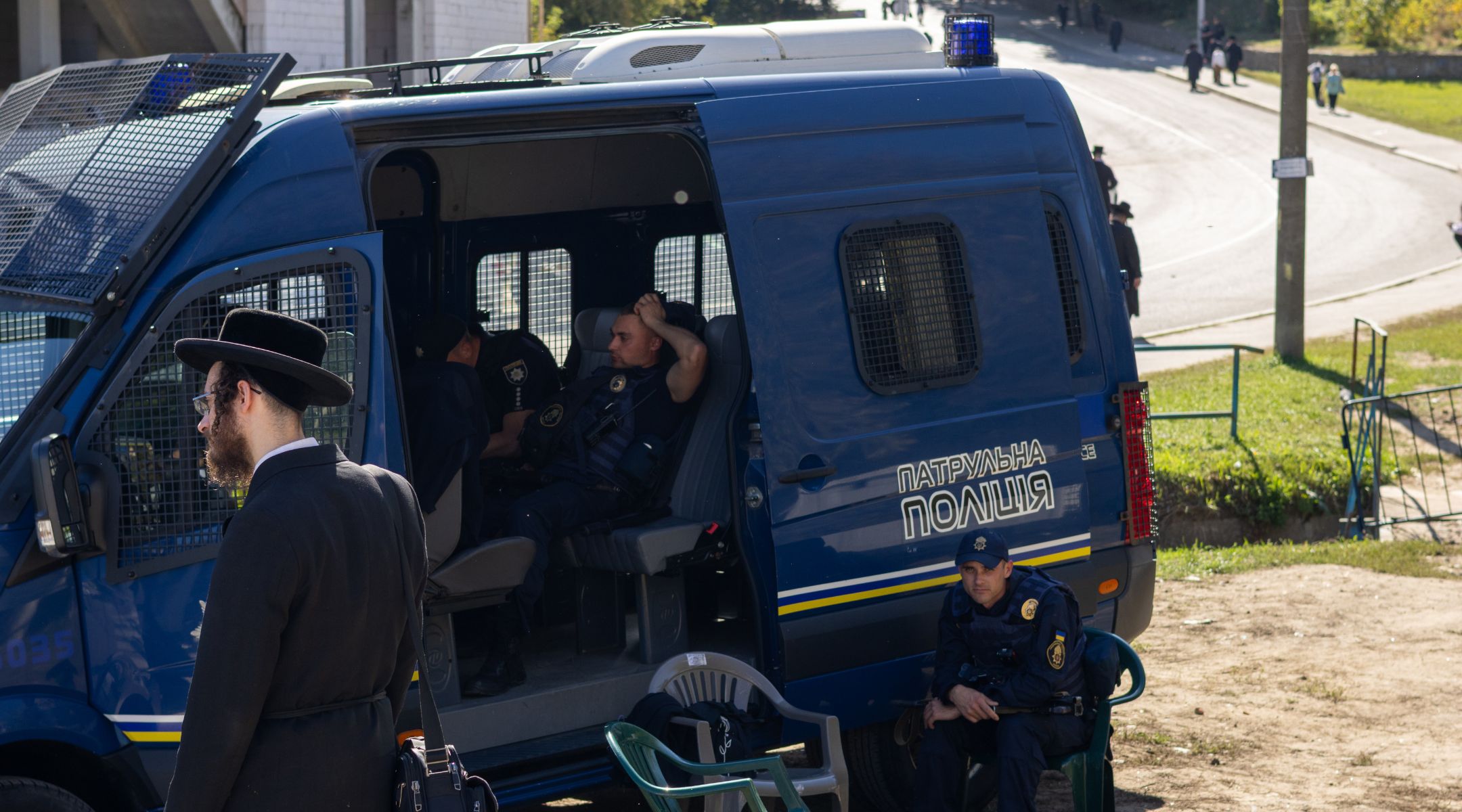
A Hasidic man stands in front of a Ukrainian police vehicle on Sept. 21, 2025 in Uman, Ukraine. (Photo by Theia Chatelle)
“The pilgrimage is a cleansing experience. If I don’t do it, I feel off for the rest of the year,” said Gavriel, who spoke on his way to visit the tomb of Rabbi Nachman and, like many of the travelers, declined to share his last name. He pointed around and said, “This is why Uman is so special. Look, there are Jews of every type and from every place here, all because of their desire for renewal and dedication to the teachings of Rabbi Nachman.”
The crackdown on draft-dodgers, however, dimmed the excitement of some of the men who made their way to Uman.
One student recounted how his rabbi, who flew from Israel to New York so he could accompany him and others on their journey to Uman, was getting calls throughout the last week from yeshiva students who had witnessed others being arrested in Tel Aviv.
“It’s crazy what they are doing. They were supposed to be here with us, and it’s not the same,” the student added.
And for others, not only has the war in Israel followed them on their journey, but they remain steadfast in their belief that yeshiva students should not be forced to enlist.
“I lost a cousin in the war. He is a dad my age, has three kids, and he got killed in Gaza. I remember the gut-wrenching scream when I found out. But still, he went on his own,” said Moshe, a father from Brooklyn. “Nobody forced him to serve. When you force someone to do something, it doesn’t work.”
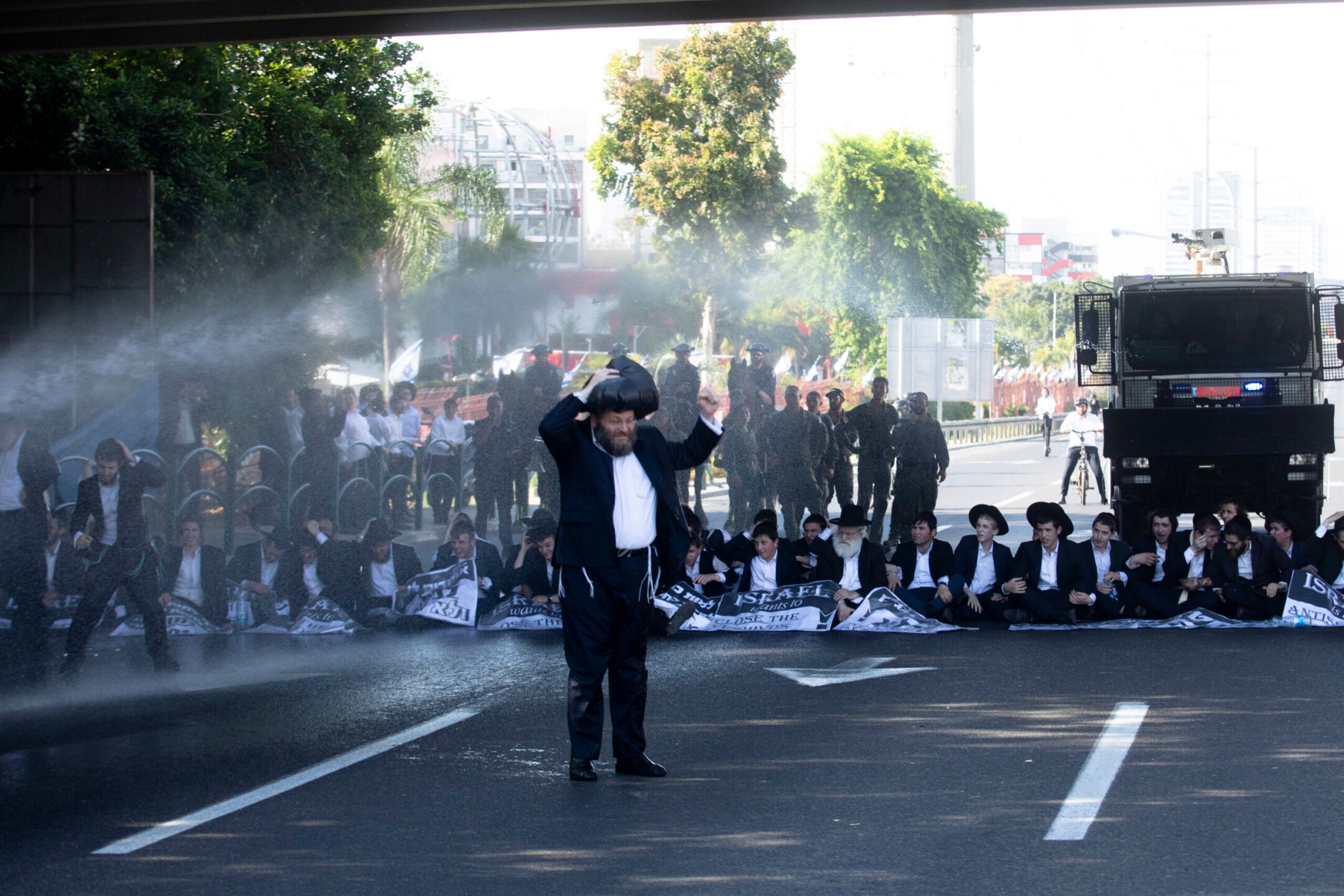
Police officers use water cannons as haredi Orthodox Jewish men block a main highway during a protest against drafting into the Israeli army on June 2, 2024 in Bnei Brak, Israel. (Amir Levy/Getty Images)
The policy change comes as Israel nears the two-year mark of its war against Hamas in Gaza, where it is expanding fighting in Gaza City. As reserve forces have borne the brunt of the fighting, the IDF has looked for ways to increase the number of active duty soldiers, including enforcing mandatory enlistment on Orthodox Jews who had formerly been exempt from service due to a special arrangement for those who dedicate themselves to full-time Torah study.
But last year, Israel’s Supreme Court ruled this exemption, known as Torato Umanuto, to be illegal, in a landmark ruling that paved the way for the IDF to incorporate haredi Jews into the military — and penalize those who refuse orders to enlist. This change has fueled waves of protests taking place across Israel, with yeshiva students blocking roads, engaging in other forms of civil disobedience, with some demonstrations drawing crowds into the many thousands.
It has also turned the Uman pilgrimage into a political football, as the haredi draft issue perpetually holds the potential to topple any government. Israeli Prime Minister Benjamin Netanyahu is balancing the demands of the haredi parties not to enforce the draft notices against the demands of the vast majority of Israelis to see haredi Jews share in the burden of army service that has grown more taxing than ever during the current war.
The government has taken steps to appease both sides. This year, it allocated 2.7 million shekels (about $800,000) to subsidize travel despite a budget deficit after the government of Moldova, through which many pilgrims travel now that Ukrainian airspace is closed, balked at the mounting costs.
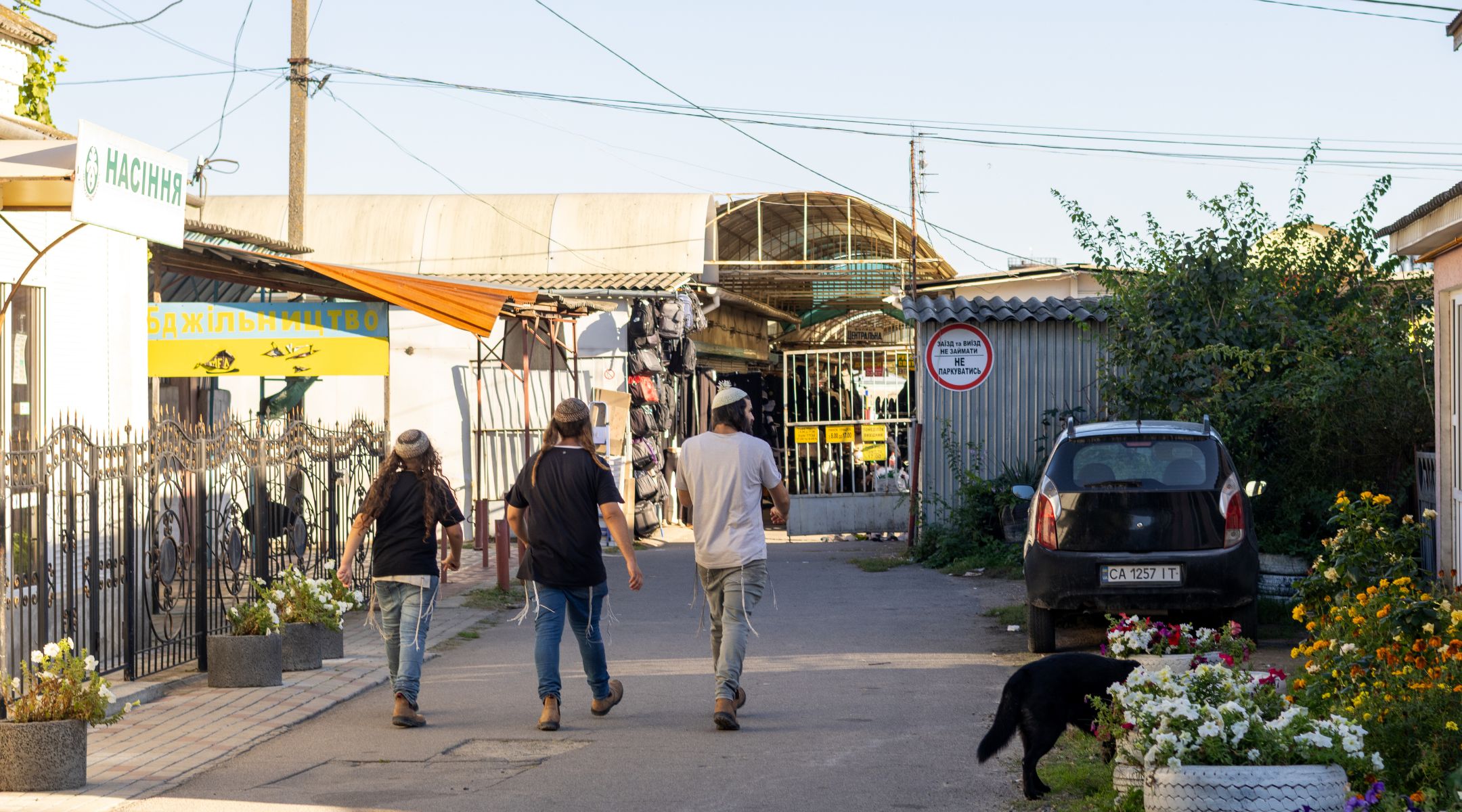
Three young Breslov Hasidim walk on Sept. 21, 2025, in Uman, Ukraine. (Photo by Theia Chatelle)
At the same time, having sent 54,000 draft notices to yeshiva students who had not yet enlisted in the military, the government said the IDF would be arresting those trying to leave the country who had refused to report for service. So far, at least 100 have been arrested on their way to Uman.
To the yeshiva students who have made the trip, the arrests are upsetting a balance within Israel in which both secular and religious needs are sustained.
“We guys sit and learn. I’m in yeshiva. I study 14 hours a day. And we have most of the guys learning that amount. So that’s what we do,” Bermann said.” And then there are the other guys who are less religious, so they go and serve in the army. Every guy does his own.”
Amongst the most observant at Uman, anger at the Israeli government for their draft enforcement operations was palpable: “The government that would like for religious people to just disappear and be obliterated,” one pilgrim said.
At the same time, the haredi students who were able to complete the pilgrimage have been engaging in worship as planned.
The journey to Uman is not easy, and because of restrictions due to the Russia-Ukraine war, it takes many months of planning to coordinate. The payoff once pilgrims arrive, though, is intense.
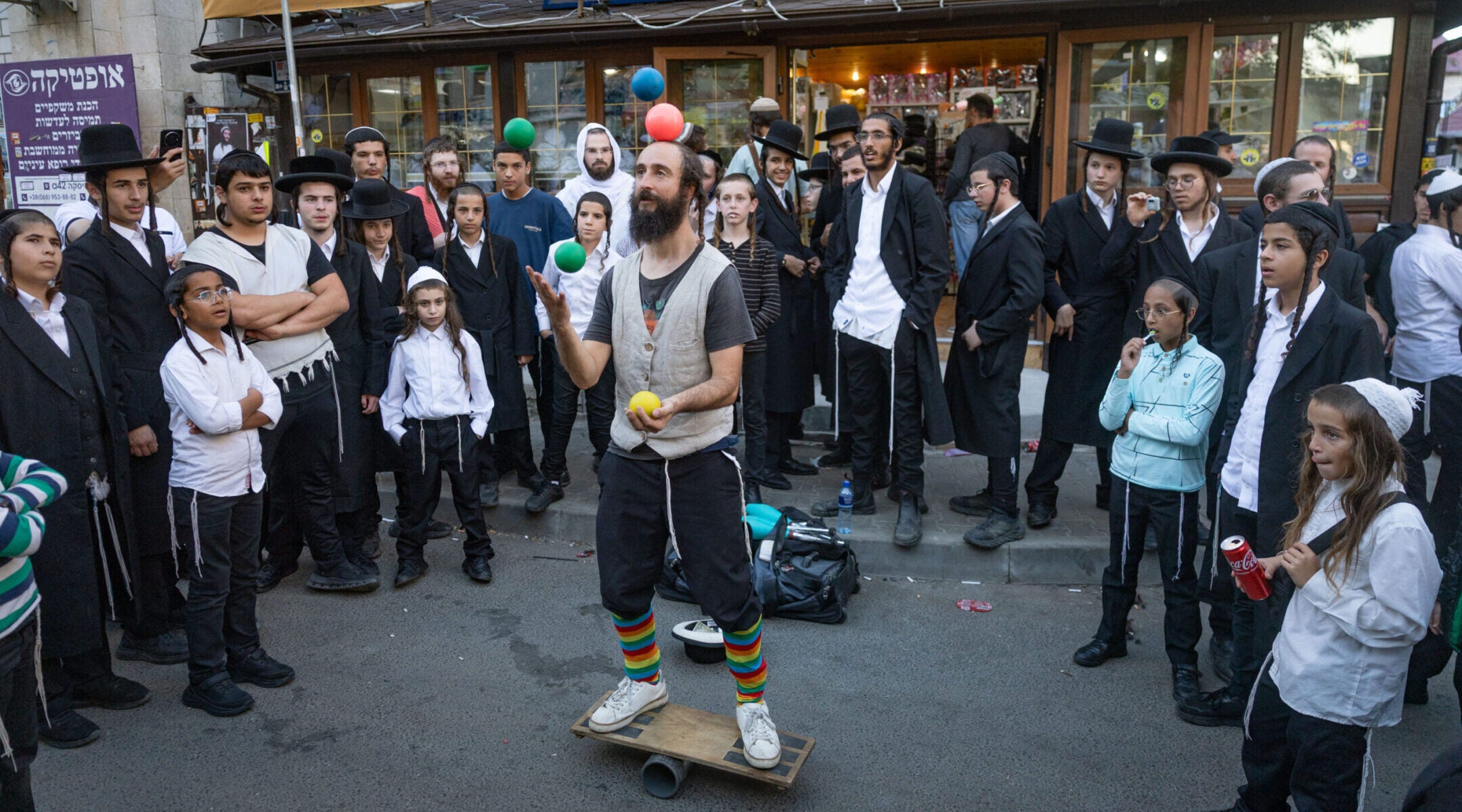
Jews seen in the street in Uman, ahead of the Jewish holiday of Rosh Hashanah, Sept. 21, 2025. (Chaim Goldberg/Flash90)
The pilgrimage, which is almost exclusively completed by men, is an annual tradition for many Breslov and non-Breslov families. Husbands and wives walked down the streets of Uman with their children, carrying gifts and groceries in preparation for the next days. Said a member of a family visiting from Bat Yam, Israel, “The war here doesn’t bother us. There is war there [in Israel] and there is war here, what do we care?”
Baruch, from Monsey, New York, visited Uman for the first time this year, despite pleas from his parents to avoid the trip due to the war.
“It took some convincing, but I’m here,” he said, adding, “We had some trouble at the border, and when we got to the checkpoint, they waved us through, just in time for Shabbos.”
Another pilgrim visiting from New York said the arrests and the war were on his mind — but he was trying to set them aside.
“ There’s a lot of distraction right now,” he said. “But I have to stay focused on what I really came here for — to, through the teachings of the rabbi, wake up in the morning and make a change.”
JTA has documented Jewish history in real-time for over a century. Keep our journalism strong by joining us in supporting independent, award-winning reporting.
